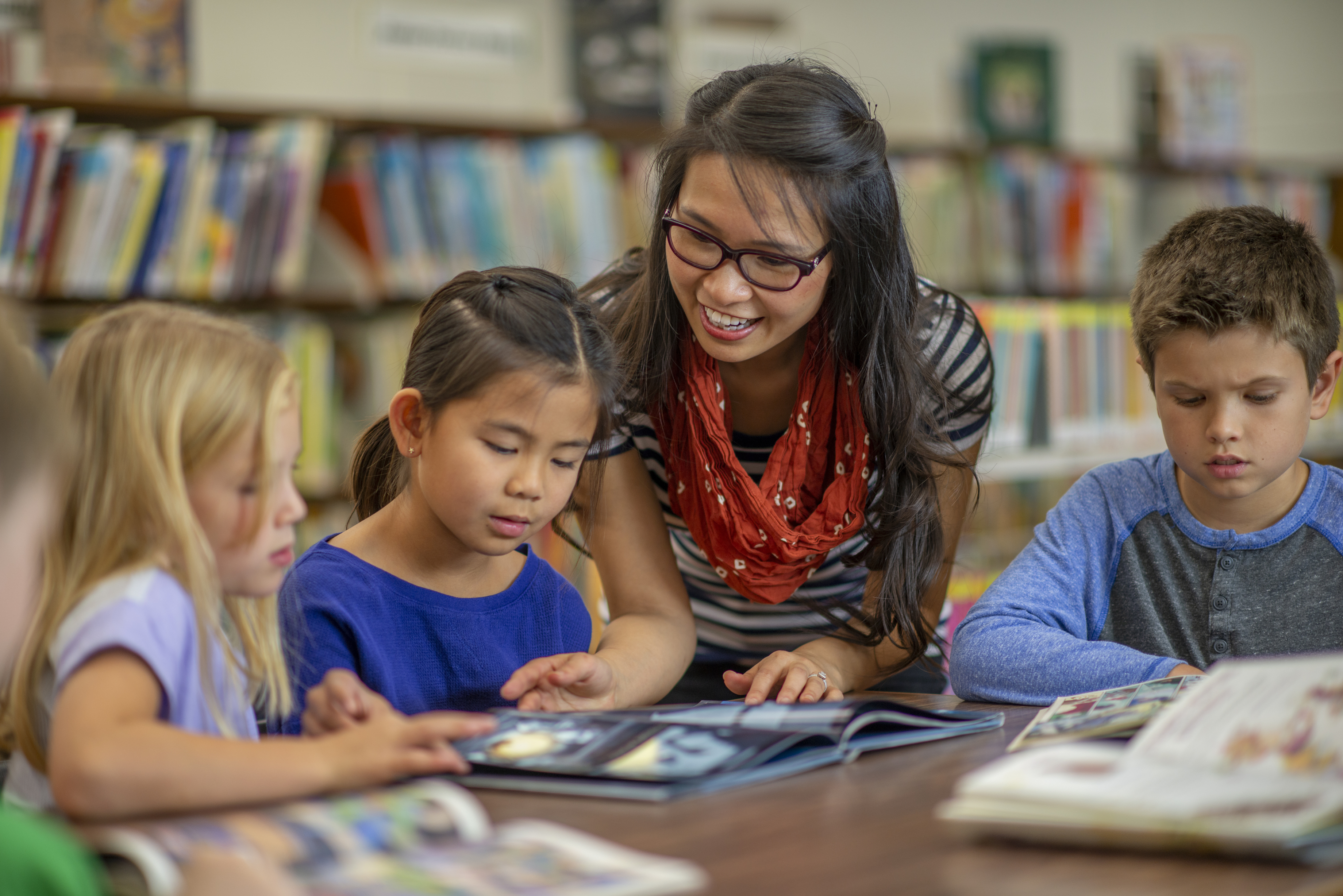
What's happening in April, May and June 2025?
This page gives you an overview of all the activity happening across our TeachingEnglish channels in April, May and June.
For teachers, we'll be focusing on the theme of Understanding my learners. For teacher educators, the focus is Understanding teacher learning. Below you'll find free online training courses, live webinars and other online events, podcast episodes and research – all related to the three-month themes. You'll also find training and resources related to our evergreen themes throughout the year. Learn more about our themes for 2025-2026 by downloading our theme calendar.
In addition to our themed events and content, we also have hundreds of lesson plans and classroom resources. Below we've selected some lesson plans to help you engage learners with topical issues and special United Nations days in April, May and June.
 Teacher pathways
Teacher pathways
Choose below from three learning pathways designed to help you take charge of your professional development and advance your career as an English teacher.
- Getting started with understanding your learners
Get started with this ready-made pathway of free tools and resources to help you:
- develop an awareness of the diversity within your group of learners in terms of their cultural, social and educational background, their learning goals and any special educational needs
- identify the existing knowledge, skills and abilities of your learners as well as their common interests, learning preferences and levels of autonomy
- use your learner awareness and understanding to make informed decisions about your teaching practice and set realistic goals to fulfil your learners' potential.
Teacher pathways: Getting started with understanding your learners
- Going further with understanding your learners
If you want to go further with your professional development, this workbook will help you take your skills to the next level. It's designed to help you create a regular learning habit and apply what you've learned in the classroom. You'll find an overview of the theme and recommended learning materials. You'll also find support to reflect on and personalise your learning. You can use the workbook in different ways – do what works for you! We hope you find it beneficial.
Teacher pathways: Going further with understanding your learners- Working on understanding your learners with others
This group study guide for teachers and teacher educators looks at understanding your learners. It forms part of a series of group learning booklets in which teachers and teacher educators will find useful theory and practice for teaching English effectively, including short case studies and professional development activities to do with others.
Understanding your learners group study guide
 Online training courses
Online training courses
We have a range of courses running connected to the theme of Understanding my learners and our evergreen themes. Live events and discussions related to these courses are hosted in our Courses for teachers community on Facebook. Learn more about our courses for 2025-2026 by downloading our courses calendar. Find answers to our most frequently asked questions about training courses.
Courses on understanding your learners:
- Motivating activities for primary – enrol before 17 June
Engage your primary learners with songs, games, chants and vocabulary activities that will make learning memorable.
Find out more and enrol on this free course
Download the free Motivating activities for primary workbook- Motivating learners – enrol before 17 June
Get learners actively involved in your lessons with effective, engaging learning activities they want to do.
Find out more and enrol on this free course
Download the free Motivating learners workbook- Classroom research – enrol before 17 June
Discover how to reflect on and explore issues in your teaching context, plan and carry out a small-scale classroom research project and communicate your findings effectively.
Find out more and enrol on this free course
Download the free Classroom research workbook
Courses connected to evergreen themes:
- Integrating digital technologies – enrol before 23 September
Learn how to use digital tools, including AI, to find, evaluate and create digital content and resources that foster inclusion and support learners' collaboration, information literacy and problem-solving skills.
Find out more and enrol on this free course
Download the free workbook- Inclusive classrooms – enrol before 23 September
Make your classes inclusive learning spaces by identifying barriers that can affect learning and practical strategies to overcome them.
Find out more and enrol on this free course
Download the free workbook- Gender in language education – enrol before 23 September
Learn to recognise different kinds of gender bias and stereotypes, some of the barriers learners face in gender equality and equity, and how to help overcome them in your context.
Find out more and enrol on this free course
Download the free workbook- How to teach speaking – enrol before 23 September
Develop your understanding of speaking skills and explore teaching techniques and activities that promote oral communication in the classroom for a range of ages and levels.
Find out more and enrol on this free course
Download the free workbook- How to teach grammar – enrol before 23 September
Discover how to help your learners notice, make sense of and become more confident using grammar with engaging, meaning-focused teaching.
Find out more and enrol on this free course
Download the free workbook- Teaching English to refugees and displaced learners – enrol before 24 March 2026
Make your classroom a trauma-sensitive learning environment. Help your learners to shine by working creatively with limited resources and by managing challenging behaviour positively.
Find out more and enrol on this free course
Download the free workbook
 Online events and webinars
Online events and webinars
See our free online events and webinars for teachers and teacher educators below. Download our webinar calendar for 2025-2026 here.
- Understanding your learners – webinars (11 April)
Join us on 11 April 2025 for three practical webinars focusing on understanding your learners and how they learn best. You can watch the event live on Facebook or YouTube or register to join us on Zoom.
Schedule and speakers
12.00–15.30 (UK time)12.00–13.00 Understanding your learners: A practical introduction (Sirin Soyoz and Melissa Thomson)
13.15–14.15 Evidence-informed techniques for better learning (André Hedlund)
14.30–15.30 Emotional safety and learning (Georgia Papamichaelidou)
Find out more and register for this online event.
You can also join the events on Facebook. No registration is necessary to watch on Facebook.- Promoting intentional dialogue in the classroom – Teacher educator webinar (29 April)
Please note that the content of this webinar is tailored for teacher educators and teachers who are engaged in facilitating the professional development of others.
Naomi Flynn, Professor of Multilingual Education at the Institute of Education, University of Reading, discusses arguments for positioning oracy (the ability to articulate ideas, develop understanding and engage with others through spoken language) more centrally in the curriculum. Through insight and practical examples from her research, Dr Flynn suggests ways in which teacher educators can guide teachers in promoting intentional dialogue in the classroom and helping their learners develop this fundamental skill for learning and life.
12.00–13.15 (UK time)
Find out more and register for this online event.- Empowering teacher educators to introduce art-based translanguaging practices – Teacher educator webinar (20 May)
Please note that the content of this webinar is tailored for teacher educators and teachers who are engaged in facilitating the professional development of others.
To navigate a multilingual world, learners need to be able to recognise their own resources, to put them into practice and to develop innovative ways to continue to grow in their learning. But how can teachers and teacher educators engage in this learning process when they themselves are often guided and constrained by their own current educational circumstances? Join us to learn about the TEMA project (Teaching English Multilingually through Art), where we are working with teacher educators in Vietnam to tackle the complex issues of innovation and creativity in language learning through a multilingual framework.
12.00–13.15 (UK time)
Find out more and register for this online event.- AI for inclusion – webinars (23 May)
In these practical sessions, we focus on how AI tools can help you tailor your teaching to individual needs and create an equitable learning environment where all learners are valued and supported. You will discover how to use AI to personalise learning, provide individual feedback and create opportunities for all your learners to thrive.
Schedule and speakers
12.00–15.30 (UK time)12.00–13.00: Transforming mixed-ability classes with AI tools (Hamed Hashemian)
13.15–14.15: Using AI to create opportunities for all students (Katherine Reilly)
14.30–15.30: Teachers share: How do we use AI to meet all learners' needs?
Find out more and register for this online event.
You can also join the events on Facebook. No registration is necessary to watch on Facebook.- Local learning, global impact – webinars (13 June)
We all know how rewarding teaching can be. It can also be very challenging. In these sessions our speakers will share expertise gained in Wider Europe on how to stay motivated and inspire your learners, especially in difficult times. You will explore practical techniques to make learning more engaging and to help learners grow. You will also learn why professional development and getting support from others is so important. Join us to get practical strategies on how to stay inspired (and inspiring!) in your teaching career.
Schedule and speakers
12.00–14.15 (UK time)12.00–13.00: Panel discussion: motivation for teaching success (Elona Kolaj, Nenad Miladinović and Tayana Letyaikina)
13.15–14.15: Staying inspired ans an English teacher (Ragsana Mammadova)Find out more and register for this event online
You can also join the events on Facebook. No registration is necessary to watch on Facebook.
- Teacher observation for learning – Teacher educator webinar (17 June)
Please note that the content of this webinar is tailored for teacher educators and teachers who are engaged in facilitating the professional development of others.
Following the British Council's CPD Framework’s revision, John Shackleton will be discussing how it describes the kinds of skills, knowledge and attributes that teachers need, and how teacher educators can use the framework to inform teacher observation, provide feedback and suggest areas of practice for teachers to develop further.
12.00–13.15 (UK time)
Find out more and register for this online event.- Facebook, Instagram and YouTube live events in April, May and June 2025
Join our online community of more than four million teachers worldwide. We will be hosting weekly events throughout April, May and June via our Facebook, Instagram and YouTube channels.
These 30-minute 'live' sessions are a great opportunity for you to join teachers from around the world.
Engage with English language teaching experts and community members on a range of topics and themes to help you develop your teaching skills, and share ideas and questions with a vibrant global online community.
See what's happening in our community on Facebook
See what's happening in our community on Instagram
See what's happening in our community on YouTube
 For the classroom
For the classroom
See a selection of lesson plans below that you can use to focus on United Nations special days in April, May and June in your language teaching classrooms.
- World Creativity and Innovation Day (21 April)
Title of lesson plan: Innovation is Great
Age group: Secondary
Level: B1 and above
This lesson is about innovation and its place in society. It develops reading and speaking skills and the use of context-specific vocabulary. The students' own experiences and opinions form the basis of all discussion and extension work.Title of lesson plan: Creativity is Great
Age group: Secondary
Level: B1 and above
This lesson is all about creativity and innovation. Learners start with a discussion about creativity, then read texts about three British inventions of the 20th century. They practise using the past simple and present perfect tenses in the context of their own experiences and achievements.Title of lesson plan: Creativity and innovation
Age group: Secondary
Level: B2 and above
Use this lesson about creativity and innovation with secondary learners at CEFR level B2. Access face-to-face classroom and online teaching versions of the materials.- World Book and Copyright Day (23 April)
Stories and poems
Age group: Primary
Level: A2 and above
Here you can find a wide range of ideas for using stories and poems in your primary classroom. All of the materials are based on authentic texts or stories written especially for primary learners. They are designed to engage and motivate children as well as develop their understanding of important themes, and encourage personal, social and emotional development.Stories and poems
Age group: Secondary
Level: A2 and above
Here you can find a wide range of ideas for using stories and poems in your secondary classroom. All of the materials are based on authentic texts or stories written especially for secondary learners. They are designed to engage and motivate teenagers as well as develop their understanding of important themes, and encourage personal, social and emotional development.Shakespeare
Age group: Secondary
Level: A2 and above
Find articles and lesson plans related to the life and work of Shakespeare for you to use in your teenage English language classroom.UK history and literature
Age group: Secondary
Level: A2 and above
Here you can find a wide range of lesson plans dedicated to areas of UK history, literature and culture to use in your secondary classroom.- International Day of Living Together in Peace (16 May)
Title of lesson plan: Peacemakers and peace-breakers
Age group: Primary
Level: A2 and above
Use this lesson in face-to-face or online teaching to promote the values of peace, respect and tolerance in your primary classroom.- World Bee Day (20 May)
Title of lesson plan: World Bee Day
Age group: Primary
Level: A2 and above
Use this lesson plan with your primary learners to help make them aware of the importance of bees as pollinators.- World Environment Day (05 June)
Title of lesson plan: The Climate Connection – Making our school green
Age group: Secondary
Level: B1 and above
Use this lesson with your learners to highlight environmental initiatives that can be implemented in your school.Title of lesson plan: The Climate Connection – Power to change
Age group: Secondary
Level: B1 and above
Use this lesson with your learners to highlight environmental initiatives that can be implemented in your school.Title of lesson plan: Buy. Use. Toss.
Age group: Secondary
Level: B1 and above
Use this lesson with secondary learners at CEFR level B1 to look at the issue of plastic waste.Title of lesson plan: Family footprint
Age group: Secondary
Level: B2 and above
Use this lesson with secondary learners to consider the environmental impacts of our families and homes.- World Refugee Day (20 June)
Title of lesson plan: Refugee poster project
Age group: Secondary
Level: B1 and above
Use this lesson to raise your learners' awareness of the situation of refugees throughout the world.Title of lesson plan: The Windrush generation
Age group: Secondary
Level: B1 and above
This lesson uses a very simple poem to convey the feelings of the Caribbean immigrants who arrived in Britain in the 1940s and 50s.
 Podcast episodes
Podcast episodes
See all our podcast episodes connected to the themes below.
- Teaching English podcast: How can we motivate our students?
In this episode, we ask the question: How can we motivate our students? Chris and We'am discuss what motivation in English teaching means to them, and the importance of motivation for learners. First they talk to Liam Printer, an expert in motivation in language teaching. He explains the different types of motivation and how we can help learners to really enjoy learning. Next they talk to Azadeh Moladoost, a PhD researcher on teacher motivation. She gives some tips on how teachers can stay motivated, even when they have restrictions on what they can do in the classroom.
Listen to the episode and download the show notes.- Teaching English podcast: How can I teach refugees, migrants and IDPs effectively?
There are in excess of 85 million displaced people in the world, with children under the age of 18 constituting around half this total. Whether a refugee, migrant or internally displaced person, developing language skills can play a huge role for these individuals – and the host communities in which they live – to withstand challenges, recover from crisis and overcome barriers. The podcast explores the British Council work on Language for Resilience to understand this further. Following on from this, Chris speaks to teacher and trainer Brian Lally about his work and research in Lebanon with Syrian refugees, and identify some core principles that teachers working in these challenging situations can use.
Listen to the episode and download the show notes.- Teaching English podcast: How can we teach difficult or taboo subjects?
Teachers often ask to what extent they should be responsible for teaching challenging material in the classroom, for example topics such as sex, sexuality, racism, politics, religion and economic inequality. Given that in most teaching situations, teachers will have to teach difficult issues at some point, it is important to think about the best way to do this, in order to minimise any problems or embarrassment, and to maximise learning for the students. In the interview, Chris and We'am talk to Rose Aylett, who tells us all about PARSNIPs and suggests many innovative ways in which these issues can be managed in the classroom.
Listen to the episode and download the show notes.
 Publications, research and insight
Publications, research and insight
See publications related to the themes below.
- Language learning ‘in the wild’: Children playing online games in English
This study sets out to explore how primary school children between the ages of eight and fourteen engage in L2 English online/digital gaming in their own time.
Language learning ‘in the wild’: Children playing online games in English
- Creativity in the English language classroom
The activities in this book will help teachers to explore the role of creativity in the classroom, both in the sense of helping learners to express their unique creative identity and also by helping them to think about and use language in a creative way. The activities are suitable for a broad range of learners from young to old and from low to higher levels, and can be used alongside your existing syllabus and course materials to enhance your learners' experience of learning English.
Creativity in the English language classroom- Challenging the translingual turn: TESOL student teachers' perceptions, practices and networks
This paper reports on a study that aimed to investigate what happens when student teachers in a TESOL programme first encounter the term 'translanguaging' and have to (re)negotiate beliefs, practices and connections in light of new learning and teaching experiences.
Challenging the translingual turn: TESOL student teachers' perceptions, practices and networks- Changes in English language teaching
- Language for Resilience: A handbook for teachers of refugees
This handbook provides guidelines to teachers who are supporting refugee children in their classes from many different backgrounds and with many different languages and finding the complexity of the situation challenging.
Language for Resilience: A handbook for teachers of refugees
- Beyond resilience: Facilitating learning and well-being in the refugee language classroom
This multidisciplinary study explores language teachers' contributions to the psychological well-being (PWB) and educational outcomes of refugee-background students (RBSs) in a University of Sanctuary setting.
Beyond resilience: Facilitating learning and well-being in the refugee language classroom